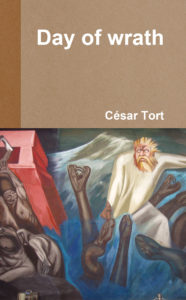One of the problems in communicating new ideas lies in what we might call paronyms. The word ‘Hitler’ for example is a paronym because when I use it I refer to, let’s say, what I have been quoting from Simms’ book and my views on it. If I use the word ‘Hitler’ with a normie, he automatically understands something very different: the Hitler of propaganda.
Another great example is the word ‘Jesus’. When I use the word ‘Jesus’ I mean the fictitious character from the devious pen of the Jew Saul (Paul), a character to whom, when the Romans destroyed the Temple in Jerusalem, another Jew, Mark, added anecdotes of his own invention. But for the normie, the word ‘Jesus’ means something quite different. Christians believe that ‘Jesus’ is the incarnation of the god of the Jews who came down to save us and, although atheists don’t believe that, many are under the impression that he existed as an ordinary man.
Something similar happens with the word ‘autobiography’. Yesterday’s trollish comment prompts me to clarify something.
The word ‘autobiography’ means, to me, something very different from what it means to ordinary people. Let’s suppose that a reader holds my book Hojas Sususrrantes in his hands and out of its five chapters decides to read the second and fourth chapters. He would be surprised to notice that almost the entire content of those chapters is a debunking of the mental health professions and a presentation of psychohistory, where my life is almost absent (see for example my translation of the fourth chapter in Day of Wrath).
 What kind of ‘autobiography’ in the normal sense of the term is that? It’s like Solzhenitsyn’s The Gulag Archipelago where, while the Russian writer uses anecdotes from his life as a pivot, the point is not to talk about his life but about the Soviet Union’s forced labour camps, where tens of millions died (something Putin cunningly omitted from his historical review when interviewed by Tucker).
What kind of ‘autobiography’ in the normal sense of the term is that? It’s like Solzhenitsyn’s The Gulag Archipelago where, while the Russian writer uses anecdotes from his life as a pivot, the point is not to talk about his life but about the Soviet Union’s forced labour camps, where tens of millions died (something Putin cunningly omitted from his historical review when interviewed by Tucker).
So beware of words that mean very different things to different people. Words like ‘Hitler’, ‘Jesus’ and ‘autobiography’, plain and simple, lend themselves to tremendous confusion. That’s why I almost always add the adjective ‘deep autobiography’ to the literary genre I would like to inaugurate, which, I believe, could cure people like Marco, about whom I have spoken in my series on narcissism (see my postscript on Monday).
But in real life not even admirers of the Führer who have suffered from mental disorders want to do this work, not even one of them whom I knew personally (see for example this comment from January). I think the late Alice Miller was right on this point. Trying to heal psychological trauma requires work. I would add that it is work similar to the time it would take us to write a doctoral thesis, with the difference that in this work we pass the microphone to the wounded child that still dwells deep in our psyche.
One reply on “Paronyms”
Although I don’t agree with everything that Richard Grannon says in this video, he gives a pretty good idea about how complex a true healing process would be for those who had maddening parents. (Curiously, after 16:20 you can guess how the idea of ‘God’ is formed in the infant who is at the mercy of the adult.)